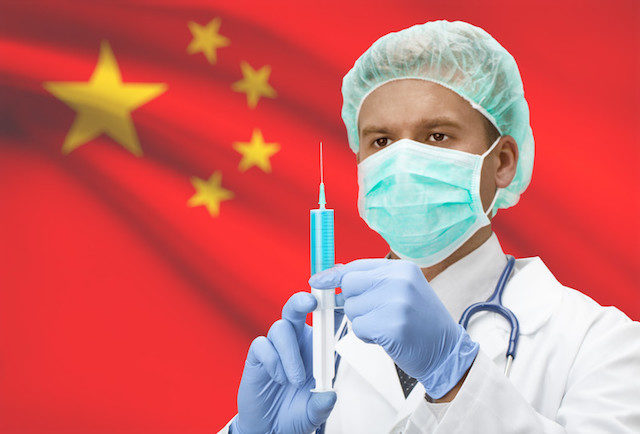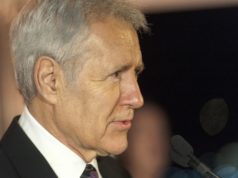The US government has recently been getting rid of Chinese-American cancer researchers from the country’s top institutions. One such researcher is named Xifeng Wu. The government had findings that she had accepted roles at Chinese research institutions when she was not supposed to. This had a terrible effect on her reputation in the research community.
This cancer research community has become more global than ever in the past decade. Scientists from all over the world share data and research about the disease that kills ten million people every year. The US National Cancer Institute’s “Moonshot” program invested one billion dollars to speed up research on cancer treatment. Their hope is to work with other international researchers to double the amount of treatment options by 2022.
Wu’s story shows a breakdown of this global togetherness. She is an award winning doctor and a naturalized American citizen, but was forced to resign from her job as director at the Center for Public Health and Translational Genomics after the findings about her ties to China were made public. She is one of four top level cancer researchers who was forced to resign in the last year. The resignations come from a push in the Trump administration to have less Chinese influence at high-level research institutions. The administration believes it will stop China from having the advantage in cancer innovation. The cost, however, is that the development of cancer research is slowed down. Patients with the deadly disease are bearing the cost of the economic war with China.

Federal Involvement
The National Institute of Health (NIH) works with the FBI in investigations like Wu’s. They say that even though the material isn’t always classified, people like Wu are stealing ideas about cancer research. The NIH is a huge funder of medical research. It donates $6 billion to cancer research a year. The Institute told a Senate committee that it found sixteen cases of undisclosed foreign government connections from important cancer researchers. Working with international scientists used to be encouraged by the NIH, but it is not anymore due to the push from the Trump administration.
Wu was not officially charged, but helping cancer research in China is a bad look in today’s politics. She had spent almost half of her life with her previous employer, but after her resignation, she returned to Shanghai as the dean of a public health school. She had to leave her family behind in the US.
Wu’s story had not been told before now. She has not wanted to be interviewed about the situation because she recently filed a complaint with the Equal Employment Opportunity Commission (EEOC). Interviews with friends and colleagues are how most of the information has become known.
History will ultimately decide if this fight back against Chinese researchers was a good step for intellectual property or a dangerous path for racial profiling and discrimination. Perhaps both might be true. It is clear, however, that Chinese people in America can be watched by the FBI and the federal government.
FBI Director Christopher Wray says they are cracking down on China because of their history of stealing US ideas and inventions. He says their government, universities, and students are all trying to steal ideas to move ahead of the US economy. Wray’s comments have unnerved the Chinese-American community. One Congresswoman called the investigations “an erosion of Chinese Americans’ civil rights.
Wu’s Work
Xifeng Wu graduated from medical school in China and received her doctorate degree from the University of Texas School of Public Health. Shortly after, she joined MD Anderson, where the studies she organized gained her recognition. She put together huge amounts of data from cancer patients in China and the US about their treatments and outcomes that has been a big help to other researchers. She found connections between what people eat and their risk of cancer, and how much people sleep and their risk of cancer. She was appointed director there in 2011.
During her rise at MD Anderson, Wu made other connections with researchers in China. MD Anderson told her to do so. The facility cooperated with Chinese researchers on clinical trials and other studies. Wu was among a group of Chinese researchers at MD Anderson that participated; all of them wanted to help their native country. China has over 4.3 million new cases of cancer each year. China even gave MD Anderson a “scientific cooperation” award in 2015. Wu was the poster child for these efforts. She worked with more than a dozen Chinese researchers on almost 100 studies. Her work has been cited more than 20,000 times in other medical studies.
International Cooperation and Reaction
Adam Kuspa, dean of research at Baylor College of Medicine in Houston, says that researchers don’t care if the data comes from other countries. If someone in China has an important piece of research, the Americans want to know. The NIH has spent $5 million sponsoring joint US-China studies, and $1 million of that went to cancer research.
Many scientists who have been doing medical research for a long time are surprised by the impact of international cooperation. For Kirk Smith, a professor at the University of California, he is surprised by the impact his work in China has had on US policy. Smith has been researching Chinese air pollution with Chinese scientists since the 1980’s.
International impact is the goal for people like Wu. They want to prevent cancer by finding the root cause. Worldwide prevention isn’t something you can steal.
Chinese scientists came under scrutiny at MD Anderson in 2014 after a Chinese researcher in Milwaukee was accused of stealing three vials of a cancer strain. It did not help that the center’s research became more commercialized; they got involved with dozens of for-profit companies that compete with the Chinese.
FBI Approach
The Wu investigation began in 2017 when the FBI informed MD Anderson that they believed cancer research had been stolen. A grand jury then requested five years of emails from MD Anderson employees. After this, MD Anderson got rid of their international research programs. The new President of the research center then allowed the FBI to search twenty three employees network files at any time.
The FBI is now warning anyone with intellectual property to be extra careful in dealing with Chinese business partners and employees. Chinese people are getting fewer work visas and many are being detained on their way out of the country to make sure they are not leaving with intellectual property. Wray said almost every one of his FBI field offices is doing economic surveillance involving China.
The FBI has made some arrests as a result. They detained a person from the Chinese Ministry of State Security, named Yanjun Xu, in Belgium. He faced charges for tricking a Chinese-American engineer into coming to China to give a confidential presentation on aerospace. He pleaded not guilty and is waiting for trial.
There have also been a number of bad arrests, though. From 2009 to 2015, more than half the arrests made under the US Economic Espionage Act were of Chinese descent. Many of these cases did not have real evidence. The rate of wrong accusations of Chinese people was double the amount of any other race. Experts think this shows the bias of federal agents and prosecutors.
Xiaoxing Xi, a Temple University physicist, was arrested in his home in front of his family. The charges were eventually dropped but the effect on Xi’s reputation has stayed. Graduate students left his research and his funding. He also believes the government is still spying on him.
The Wu Investigation
Wu became a target when the FBI decided to pay attention to which researchers were meeting federal grant requirements. MD Anderson was notified that Wu was not meeting these requirements because she was also doing work in China and getting help from younger researchers. MD Anderson then did an in-house investigation where they decided Wu was not behaving ethically like their policy requires.
A policy like that one is way different than at most research centers. Getting help for projects through junior researchers is very common in the industry.
Wu also did not notify MD Anderson of some of her Chinese contacts. She said that is because she worked with them at MD Anderson and not in China, but the research center said it didn’t matter. MD Anderson also said she improperly accepted payment from Chinese institutions, but offered no evidence Wu actually did so. Many of the company’s conclusions against Wu were based on “adverse inferences,” where they assumed the worst because Wu would only respond to questions in writing.
Wu actually had evidence that she did tell MD Anderson about some work performed for Chinese researchers. MD Anderson didn’t mention that in their investigation report. Most colleagues think justice was not served. Scientific research across borders is meaningful, but cases like Wu’s portray it as un-American. That just isn’t true.
MD Anderson’s president said that they have a duty to Americans because their work is federally funded through the NIH. He said other countries are trying to take advantage of the United States.
Fighting Back Against Prejudice
A recent panel discussion run by the FBI in Chicago tried to convince Chinese Americans that they were not being discriminated against. One of the panelists, however, said that bad prosecutions have created a bad public image for the Chinese. The panelist described one such prosecution, when the FBI charged a National Weather Service hydrologist who had done nothing wrong.
MD Anderson is one of two research institutions to fire a Chinese scientist over NIH rules. Baylor University, right next to MD Anderson, says they have paid much more attention to the rules since. Some colleges such as Yale have publicly supported the privacy of these Asian researchers in America.
One scientist said that cancer research develops so slowly that it’s tough for other countries to actual steal anything of importance. Even if they could, science should be shared for the betterment of the world.




























